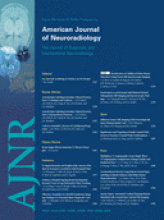Abstract
BACKGROUND AND PURPOSE: The oculomotor cistern (OMC) is a small CSF-filled dural cuff that invaginates into the cavernous sinus, surrounding the third cranial nerve (CNIII). It is used by neurosurgeons to mobilize CNIII during cavernous sinus surgery. In this article, we present the OMC imaging spectrum as delineated on 1.5T and 3T MR images and demonstrate its involvement in cavernous sinus pathology.
MATERIALS AND METHODS: We examined 78 high-resolution screening MR images of the internal auditory canals (IAC) obtained for sensorineural hearing loss. Cistern length and diameter were measured. Fifty randomly selected whole-brain MR images were evaluated to determine how often the OMC can be visualized on routine scans. Three volunteers underwent dedicated noncontrast high-resolution MR imaging for optimal OMC visualization.
RESULTS: One or both OMCs were visualized on 75% of IAC screening studies. The right cistern length averaged 4.2 ± 3.2 mm; the opening diameter (the porus) averaged 2.2 ± 0.8 mm. The maximal length observed was 13.1 mm. The left cistern length averaged 3.0 ± 1.7 mm; the porus diameter averaged 2.1 ±1.0 mm, with a maximal length of 5.9 mm. The OMC was visualized on 64% of routine axial T2-weighted brain scans.
CONCLUSION: The OMC is an important neuroradiologic and surgical landmark, which can be routinely identified on dedicated thin-section high-resolution MR images. It can also be identified on nearly two thirds of standard whole-brain MR images.
- Copyright © American Society of Neuroradiology












